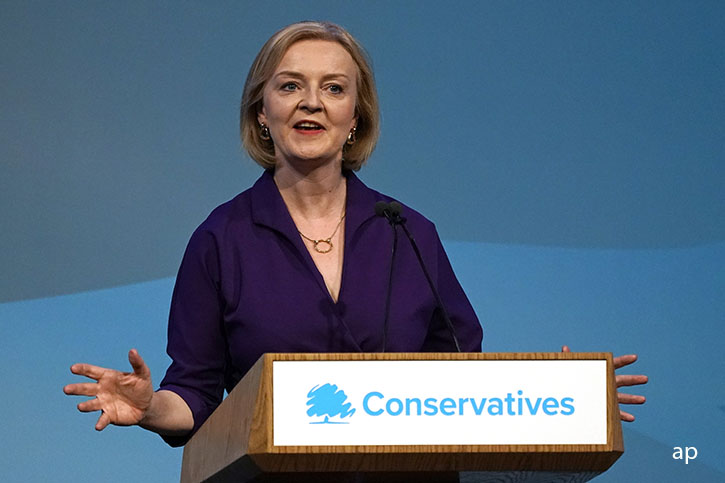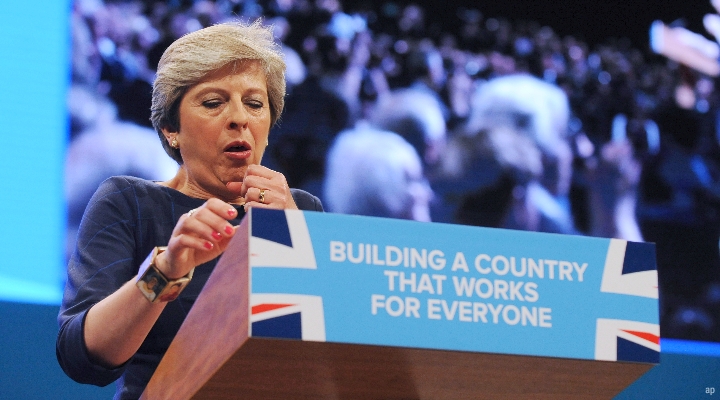
With Liz Truss confirmed as prime minister, most of today's column inches will be dedicated to politics. But our readers will probably be more concerned with the likely economic impact of a new PM – and what that will mean for UK equities, sterling and bonds.
Energy bills are of course voters' biggest concern right now, and Truss is promising a new package this week, in addition to the measures announced by former chancellor (and defeated candidate) Rishi Sunak in May this year.
It’s probably too early to say the various promises made to Conservative members amount to economic policies but let’s look at them with the help of experts and fund managers.
More details are expected soon, which could be in the form of an "emergency" Budget or the standard autumn fiscal event (last year’s was on October 27, 2021). “We would expect a series of budget measures skewed toward tax cuts, along with new economic and government funding projections, over the next week or so," says Daniele Antonucci, chief economist and macro strategist at Quintet Private Bank.
The central plank of Truss’s campaign has been tax cuts. These are welcomed by those who pay tax, naturally, especially after the National Insurance hikes in April 2022 (and since tinkered with). But they come amid sterling weakness, rising interest rates, and expectations of a recession (we could be in one already, extrapolating from the latest ONS data).
Cutting taxes is usually a bonus deployed during more benign economic conditions; ones where governments have more “wriggle room”. Truss has also floated the idea of reversing rises in corporation tax planned for next year, when the rate is due to go from 19% to 25%.
"The gilt market and sterling are unlikely to take too kindly to a big increase in government borrowing at a time of high inflation and rising interest rates unless backed up by a credible plan to reduce government borrowing and debt over the medium-term," says BlueBay Asset Management strategist David Riley.
Reshuffle Update
Truss reshuffled the Cabinet, as expected, and appointed Kwasi Kwarteng as chancellor, the third person to hold that office of state this year after defeated PM candidate Rishi Sunak (2020-2022), Nadhim Zahawi (July-September 2022). Kwarteng has come from the Department for Business, Energy and Industrial Strategy, so he will be abreast of the challenges facing the UK economy.
Like Truss, he is comfortable with "fiscal loosening" as way out of the current crisis, which in layman's terms means higher government borrowing and tax cuts.
Some other new appointments:
> James Cleverly as foreign secretary
> Suella Braverman as home secretary
> Jacob Rees-Mogg as business/energy secretary
> Chloe Smith as work and pensions secretary
Some Useful Links:
Whoever’s Intray it Is, It Will be Full
The Bank of England’s War of Independence
Citigroup: Inflation Heading for 18%
Crisis Inflation Has a New Meaning
Summer’s Over for Everyone but Truss and Sunak
Worse Outcomes
Economists are concerned that Truss's promises are essentially "unfunded", so are not balanced by spending cuts, and will trim 1% off economic output (GDP).
Deutsche Bank economists, for instance, put out a note today looking at the risk to sterling from tax cutting plans, warning they could lead to "materially worse outcomes". Truss has also trailed VAT cuts as a possible policy, with some suggestions this could fall to 5% from the current rate of 20%. Whether this is targeted – i.e. on energy bills and broadband – remains to be seen.
Tax cuts also tend to be inflationary, which is something the UK really doesn’t need – Citigroup recently predicted a rise to 18% for CPI, and fellow investment bank Goldman Sachs has raised the stakes with its forecast of 22%.
The expectation of tax cuts and higher spending has washed into the government bond (gilt) market, where yields have been rising. Markets are expecting the Bank of England to have to raise rates, perhaps to above 4% at the peak, to combat rising inflation. Government bond yields reflect inflation and interest rate expectations – movements in yields tend to be pedestrian but some of the changes have been significant over the last year.
"Yields have registered the biggest monthly rise since 1986 as Liz Truss hurtled towards Downing Street, throwing out promises of slash and spend on the campaign trail, which threaten to cause fresh problems for UK economy," says Susannah Streeter, senior investment and markets analyst, Hargreaves Lansdown.
Gilt Yields Soaring
As an example, the two-year UK gilt yield has gone from a measly 0.17% a year ago to 3.14% now and the 10-year yield has soared from 0.70% to 2.92% today. If you’re buying bonds today, you’re getting a better yield than in 2021, but inflation is still way above this.
Higher interest rates also mean the government has to pay more to borrow money to finance long-term projects and meet welfare/NHS bills, which are likely to increase as the economy weakens.
Financial markets also fret about public finances, a commonly-used but misunderstood term that covers the stewardship of the economy.
Until recently, Conservatives until recently were fans of austerity and achieving a budget surplus – when the government spending is less than its tax receipts – but the pandemic has blown a hole in the prudence narrative. Still, the money spent in the last two years must eventually be paid back - and the interest payments will be dearer as rates rise.
Growth is now the main worry and will be the focus of the new Truss administration as it eyes a General Election in two years. Truss hopes, against the economic mainstream, that tax cuts will spur growth and steer us out of recession, on the grounds that more money in the pocket will find itself into goods, services and the housing market. More realistically, it could be used to pay off debts accrued during the cost of living crisis.
While downplaying another windfall tax alongside the one introduced in May this year, there’s talk of a freeze in energy bills. This is inevitable and will be expensive, argues, Ed Smith, Co-CIO of Rathbone Investment Management.
Smith is a proponent of targeted fiscal policy, as long as it’s "complemented by credible post-crisis growth policies", which seem to be thin on the ground amid the fanfare of the leadership contest.
David Zahn, head of European Fixed Income at Franklin Templeton expects higher yields in the coming months as investors wait for more details.
"Investors will wait for her new policies and cabinet appointments and will penalize increased deficit spending without a plan of how to bring the UK government financial house in order when the demands on the government are very substantial."
Sterling Weak, Confidence Low
Currency markets are hardly giving their backing to Truss in the way they did when Boris Johnson won a landslide in 2019, a fact keenly felt by tourists to the US and the Eurozone this summer. The pound would have bought you $1.39 in September last year and that’s now $1.15. And one pound is now worth €1.16, although euro weakness means this is roughly the same as a year ago.
Confidence is the key and that’s been lacking even with a change of leadership. "With borrowing likely to rise, the currency and bond markets will need to be convinced that the new PM has a credible plan," says BestInvest managing director Jason Hollands.
What about equity markets? Hollands looks to history and notes that all but one of last UK prime ministers since Edward Heath have presided over positive annualised returns (Gordon Brown is the outlier). Labour PM James Callaghan, who was leader during (another) troubled period for the UK, actually saw the highest annualised returns of nearly 24%.
"It is important to remember when the economic headlines are grim that that the UK equity market is highly international in nature, with around two-thirds of the earnings of UK listed companies made outside of the UK," he says.
While the domestically-focused FTSE 250 is off 22% so far this year, the FTSE 100 is only 3% lower, reflecting the positive impact of weaker sterling and dividends paid in dollars. The FTSE 100's energy bias is also helping to cushion the blow for investors amid increasing economic gloom.





























